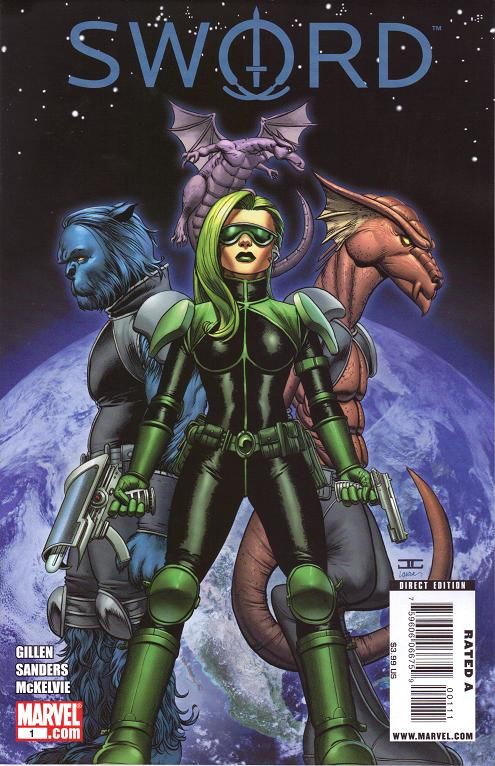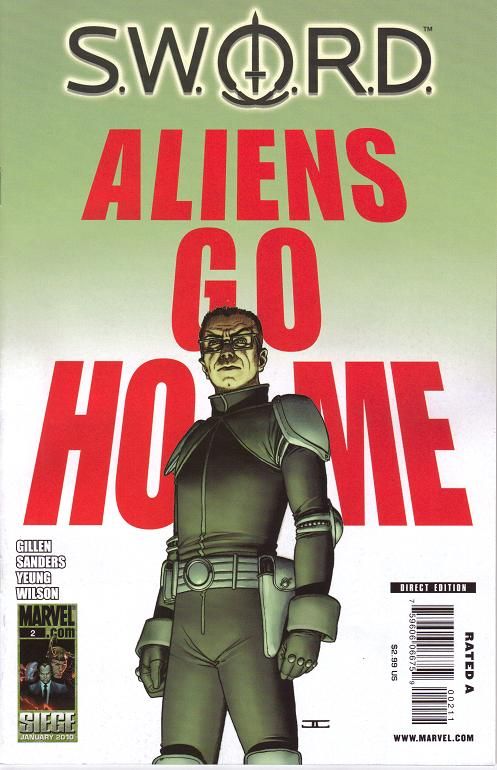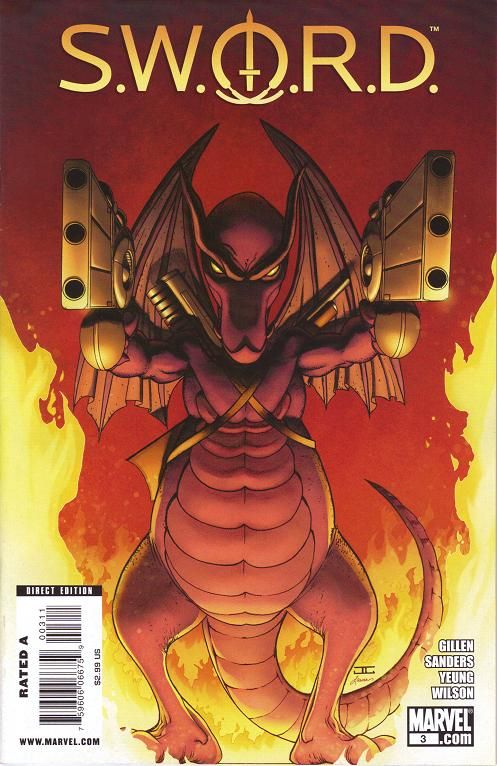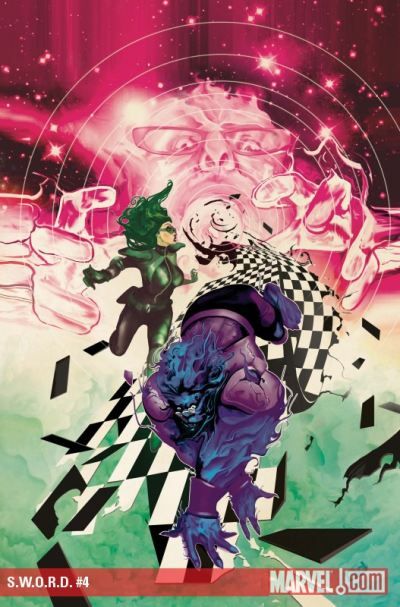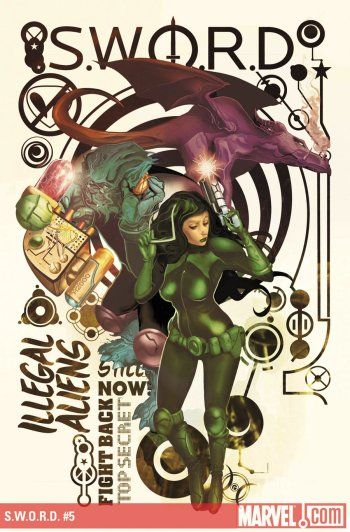No, this isn't a post hand-wringing about the cancellation of a cool Marvel series. This is a post about why you shouldn't wring your hands. Oh, and how S.W.O.R.D. never stood a chance. I know, shocking.
So, the rumors are true, and Marvel's S.W.O.R.D. series is dead after issue #5. Kieron Gillen has confirmed it on his blog, so let's all have a moment of silence for yet another nifty comic that died too soon. The next one that comes down the pike really ought to have a scene set in a graveyard where the recent dead series lie - this one, Captain Britain, Agents of Atlas, The Order, Ant-Man ... that would be a fun scene.
Gillen makes some interesting points about the cancellation in the post. He writes:
The first five issues are a neat little arc, which will collect into an agreeably intense little trade. It was planned so if the worst did happen - and launching a new ongoing in the current market is an enormously risky business - that it would hold together and wouldn't leave anything dangling. I haven't changed a panel in 5, basically, and I'm pleased with where I leave the cast.
He then writes that the petition to keep the book alive is touching, even if it's ultimately futile. Why is this, you wonder? Because Gillen then goes on to point out that this book was dead even before the first issue shipped. Let's let him explain:
Comics operate on a system of pre-ordering. As in, the first issue's orders were in before anyone had even read a single page of the book. The numbers which people are reporting are low enough that the inevitable second issue dip - also ordered before anyone had read issue 1 - would move it into a clearly dangerously low sales for a book in the X-family. In other words, I actually don't feel that bad about the cancellation. It was already on unsteady ground before anyone had even read the thing, and got annoyed over Sanders' [B]east design or my over-verbal theatrics.
He finishes with:
In other words, people being vocal about their like of a comic isn't really just about trying to save S.W.O.R.D. - it's about making it clear that this was a book you were interested in, and encourage editors and publishers to think about books in a similar part of the emotional terrain and then work out a way to sell 'em.
He has a good point with that last one - the petition might not save S.W.O.R.D. (nor do I think Greg Hyatt, who came up with it, could realistically believe it would), but it's useful to let Marvel know that people actually do like comics that don't star Wolverine or are written by Bendis. I know, what a concept. But still.
So let's think about the launch and cancellation of S.W.O.R.D. I was speaking to the guy at my comic book shoppe about it getting the axe, and he said, very logically, that it was a book written by an unknown writer (sorry, KG!) and an unknown artist (sorry, Mr. Sanders!) that spun off of a storyline that ended, what, two years ago? I only surprised Marvel green-lit it in the first place. I'm certainly not shocked that it got cancelled. But it does bring up a good question, and that is ... are Marvel and DC "real" companies? They're certainly not run like ones. I'll explain (concentrating on Marvel, although we could easily do this for DC, as well).
Marvel launches these series with no market research whatsoever. Many folk have pointed out that perhaps they should have done this as a mini-series and seen what the sales figures were like. They did that with Agents of Atlas a few years ago, and apparently the sales were crappy on that, too, so naturally Marvel launched an ongoing continuing that story. But at least they had some data about it. All they had to base this on was a series that was a vanity project for a creator from outside comics who brought a bunch of fans who didn't care about the characters he used, but read the book because he was writing it. I'm sure some people read Astonishing X-Men because Whedon brought Kitty Pryde back, but I bet a large part of the audience for that book were "Whedon fans," not fans of the characters. So any spin-off involving the characters Whedon invented but not Whedon himself was going to be a hard sell. So, of course, Marvel waited two years to launch it.
Then, of course, there are the "pre-order" numbers. It's been pointed out that we, the readers, are not Marvel's customers - the retailers are. No retailer is going to order a lot of issues by an unknown writer and an unknown artist. Let's face it, most comic book fans follow characters, and when your biggest "name" character in a book is Henry McCoy, it could be a book featuring nothing but a Beast/Abigail/Death's Head hard core porn threesome and it would take a while to catch on. Retailers were never going to order this in large numbers, and even if they sold out the ones they did get, this is really the epitome of a book that needs word-of-mouth before retailers will bump up their orders. That Marvel decided on its fate before any issues had shipped is, well, kind of dumb. But it's not surprising.
Marvel is also ignoring trade paperback numbers, given that no trade has come out yet. I have no idea what the numbers are of "trade-waiters," but then again, that's not my job. Does Marvel have any idea how well their trade paperbacks sell compared to individual issues? I'm sure the single issues still outsell trades by a fairly decent margin, but I have no idea, and I'm willing to bet nobody at Marvel does either. Many people have commented on this blog that they were waiting for the trade on S.W.O.R.D., and while Marvel might think that's a stupid strategy, it's their own damned fault. They're the ones who bring everything out in trade, at a price that's often comparable or even cheaper than buying them as single issues, and with no advertisements. I'm a sucker for not buying everything in trade, I get that, but Marvel is really heavily relying on people like me, who get individual issues for no other reason than they like reading a lot of books right away. I admit it's totally irrational. But that's the way it is. As more and more people move to trades, will Marvel take that into account? If sales for the inevitable S.W.O.R.D. trade do well, will Marvel return to Gillen and Sanders and ask them to continue the story? Yeah, probably not.
Marvel's pricing policy elicits head-scratching, too. They launched this book with a $3.99 price point, which already put it in a bad position. Yes, it was a bit longer and therefore probably worth it, but the fact is (and yes, I'll keep going back to it), this book was written by someone who is not widely known and drawn by someone who is not widely known and featured a back-up story drawn by someone who is not widely known. And it was a dollar more expensive than most of Marvel's output. To use anecdotal evidence, Mary Warner, who comments here often, wasn't going to buy it because of the price, but she took a chance ... based on on-line recommendations (mine, but perhaps others as well). And while she didn't love the plot, she loved Gillen's dialogue. Now, I'm not saying that everyone who tries the book will love it, but Marvel didn't even take that into consideration. As Gillen pointed out, this book was pretty much cancelled before people like Mary could even check it out. Sheesh. Why Marvel can't lower the price on its #1 issues, especially the ones they don't have any confidence in, is beyond me. I understand that DC can do it with Vertigo for a variety of reasons, and perhaps Disney money can help Marvel do that more often, but even so - are you telling me that Marvel's bottom line is so tenuous that they can't take a bath on a first issue twice or thrice a year (they don't launch all that many books like this; for instance, I wouldn't lower the price on New Mutants, which is a recognized brand)? I guess so.
Here's the strange thing about Marvel and DC: they're not real businesses. Nobody in charge knows much about business. Quesada is an artist, for crying out loud. I might love Vincent van Gogh, but I don't want him running a business! Dan DiDio has been in business for years, but from the scant information about him on Wikipedia (yeah, I know), it doesn't sound like he has much actual business training. I could be wrong. The bigwigs at Marvel and DC have no idea how to run a successful business. First, they don't strike while the iron is hot, as I pointed out above. Why start this book after all the buzz is gone from Astonishing X-Men (let's not even talk about how the buzz on that book dissipated because of the delays; let's just pretend it was still as hot as it was at the end as it was at the beginning)? That's really the only way it could have succeeded, even with a different writer and artist. I realize that Gillen pitched this, but why would they approve it in the first place? And, having approved it, why would they not do more research? Why not do it as a mini-series? Or a back-up in a more popular book? Why don't they do surveys? Gillen has done some other work for Marvel - have they tracked if his Thor work is more popular than the regular Thor stuff, or less? Marvel could ask people about whether they would buy a book about Abigail Brand and her organization, or a book written by Gillen, or a book drawn by Sanders, or even a book that features Death's Head (but then they would SPOIL the first issue, and God forbid we do that, right?). I have rarely seen a mainstream superhero book get reviewed on-line early enough for people to pre-order it. Presumably, Gillen and Sanders had something in the can by the time issue #1 was solicited. Couldn't Marvel have gotten that into the hands of some people to drum up interest in the book? I've ranted about advertising before - Marvel and DC simply don't do it. Sure, we get house ads, but when you consider that something like Entertainment Weekly actually reviews graphic novels, they would probably do well to put an ad or two in there. I know they're prohibitively expensive, but that just means that Marvel isn't one of the big boys and shouldn't act like it. But they do. Time to nut up, Marvel!
Finally, retailers aren't exempt from my contempt, either. I know that retailers aren't in the business of selling Marvel's books for them, but ... it seems like they do have a bit of a symbiotic relationship. I have mentioned before that the comic book store where I shopped in Portland, Excalibur Comics, had a nifty policy. They noticed the buying trends of their customers and suggested books that they might like. They knew I was buying some Warren Ellis books back in the 1990s, so they asked me if I wanted to take a chance on Strange Kiss, his first Avatar mini-series. I said sure, and that was that. I would never have heard of Strange Kiss if not for the guy behind the counter. I have no idea if they were exceptional or not, but I know that the place I go to now doesn't do that, and I really like the place I shop. Retailers, I would think, would be interested in hooking more readers for more books. Even if it doesn't work, why not try it? Marvel could even get exhort retailers to do it. "Hey, we have this new comic called S.W.O.R.D. coming out. It's written by the guy who wrote Phonogram and some Thor stuff. Could you ask your customers if they'd be interested in it?" It's not fucking rocket science, but it's apparently beyond the higher-ups at the Big Two. The guy who works at my store knows very well who orders what at the store - he knows, for instance, that some people get only Bat-family comics. He's worked there long enough that he knows what people like. His boss, the owner, apparently has no interest in doing surveys, so that's why he doesn't do it, but I bet they could if they wanted to. I bet they would if Marvel or DC asked them to, with some carrots attached.
S.W.O.R.D., I wrote above, was doomed from the start, not only because of Marvel's poor marketing. As we should all know by now, there's a way of things if you come to the Big Two from independent comics. Gillen wrote a well-regarded mini-series and a sequel, then got some minor work from Marvel. He's still in his "building a brand" stage, meaning he's going to write minor Marvel stuff and gain an audience of people who won't buy Phonogram because it's "indy." They will, however, start to see his name on higher-profile stuff like Thor one-shots and perhaps hear about his highly-regarded but cancelled work like S.W.O.R.D. He may have to write another series like this before enough people who buy only Marvel superhero books know who he is and how good he is. Then, maybe, he can get away with a book like this. At this point in his career, it was fairly easy to predict that S.W.O.R.D. would go down in flames. That's just the way it is. Word of mouth doesn't work that well. For all the good reviews the book received, the fact is that most comic book readers don't put much stock in Internet reviews. They just don't. That's fine, but it's the way it is. Most people who shop at my store, according to the guys who work there, don't look through Previews. They don't sample new stuff. They buy every single issue of Amazing Spider-Man not because they like the writers or artists, but because they like the character. And then they complain that Mark Waid or Joe Kelly or Marcos Martin or John Romita, Jr. (or whoever) is ruining the book ... but they keep buying it. That is, it seems, the majority of comic book readers. Marvel and DC don't seem to care, so I don't. That's their thing. But it makes it almost impossible for a book like S.W.O.R.D. to succeed. Especially if we consider that Marvel and DC aren't real companies.
I envision Joey Q. and Dan DiDio and their henchmen sitting in a room, affixing some sort of tacky substance to pitches, throwing them at the wall, and whatever sticks is the one they approve. It's probably not quite as random as that, but I can't believe it's much more scientific than that. They have no idea when they announce a project that doesn't star one of their "big guys" whether it will sell or not. I know that nobody in any field knows what's going to sell and what's not, but shouldn't you at least try to find out? And shouldn't you have a more scientific way to figure out whether something is selling? Television networks cancel shows fairly quickly, but at least they have instant ratings to look at. Marvel had no idea if S.W.O.R.D. was going to sell, and they pretty much banked on it not selling. And that seems like a strange way to do business. Oh, that's right. I forgot.
As I wrote above, I'm not that bent out of shape that S.W.O.R.D. won't continue. Shit happens. I just continue to be fascinated that Marvel and DC can manage to stay in business. They must be doing something right, but I just can't see what it is very often.


